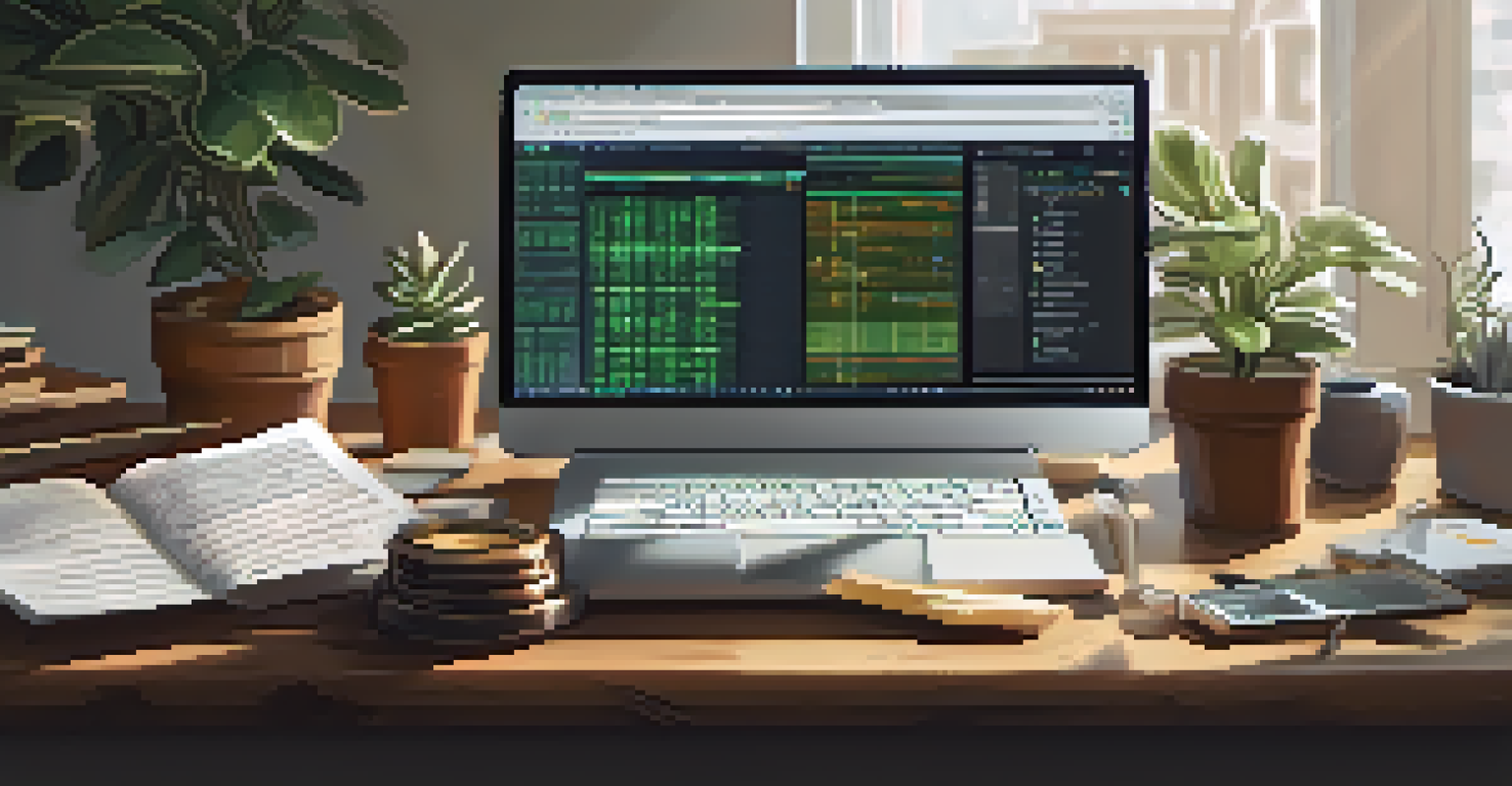Best Practices for Securing Cryptocurrency Transactions Today

Understanding the Importance of Security in Crypto
In the world of digital currencies, security is paramount. With the rise of cryptocurrency usage, hackers and fraudsters are always on the lookout for vulnerabilities. Understanding why security matters can help you appreciate the practices that follow.
The first rule of hacking is: you can't hack what you can't see.
Every transaction you make could potentially be targeted, making it crucial to take proactive steps. Just like locking your house before you leave, securing your crypto wallet is a necessary habit. Ignoring security can lead to devastating losses that are often irreversible.
By adopting solid security practices, you not only protect your assets but also contribute to the overall integrity of the cryptocurrency ecosystem. A secure transaction environment fosters trust and encourages more people to enter the market.
Use Strong and Unique Passwords for Wallets
One of the simplest yet most effective ways to secure your cryptocurrency is to use strong and unique passwords. Think of your password as the key to your digital safe—if it's weak, it's much easier for someone to break in. A mix of letters, numbers, and special characters can make a significant difference.

Avoid using easily guessable passwords like '123456' or 'password'. Instead, consider using a password manager to generate and store complex passwords securely. This way, you won't have to remember every single password, and you can ensure they're robust.
Prioritize Security in Crypto
Understanding the importance of security can help protect your assets and foster trust in the cryptocurrency ecosystem.
Regularly updating your passwords is also a good habit. Just as you wouldn’t keep the same key for years, change your passwords every few months to maintain security.
Enable Two-Factor Authentication (2FA)
Two-factor authentication (2FA) adds an extra layer of security to your transactions. It requires not only your password but also a second form of verification, such as a text message or app notification. This means even if someone steals your password, they still can't access your account without that second factor.
Security is not a product, but a process.
Think of 2FA as a security guard at the entrance of a club. Even if someone has an invitation (your password), they still need to show ID (the second factor) to get in. Many platforms offer 2FA, so make sure to enable it wherever possible.
While it might seem like an extra step, it takes only moments to complete. The peace of mind that comes with knowing your transactions are more secure is worth that little bit of extra time.
Be Cautious with Public Wi-Fi Networks
Using public Wi-Fi to conduct cryptocurrency transactions is like going swimming with sharks—it's risky. Hackers can easily intercept data on unsecured networks, putting your sensitive information at risk. Always think twice before connecting to public Wi-Fi for financial activities.
If you must use public Wi-Fi, consider using a Virtual Private Network (VPN). A VPN encrypts your internet connection, making it much harder for anyone to snoop on your activity. It’s like having a secure tunnel for your data, keeping your information safe from prying eyes.
Use Strong Passwords
Employing strong, unique passwords is essential to safeguard your cryptocurrency wallet against potential breaches.
Whenever possible, use a secure and private network, such as your home Wi-Fi, especially when managing your cryptocurrency. Your digital assets deserve the same level of protection as your physical belongings.
Keep Your Software Up to Date
Keeping your software updated is a fundamental practice that many overlook. Software developers regularly release updates to patch vulnerabilities and improve security features. By neglecting these updates, you leave your wallet and transactions exposed to potential attacks.
Think of software updates as routine check-ups for your digital devices. Just like you wouldn't skip a doctor’s appointment, don’t ignore those notifications to update your apps or operating systems. Regular maintenance can prevent many security issues before they arise.
Additionally, enable automatic updates whenever possible. This way, you won’t have to remember to do it manually, ensuring your software is always equipped with the latest security enhancements.
Use Hardware Wallets for Long-Term Storage
For long-term cryptocurrency storage, hardware wallets are an excellent choice. These physical devices store your private keys offline, making them much less vulnerable to online threats. It’s akin to keeping your cash in a safe rather than leaving it out in the open.
Hardware wallets are designed specifically for securely storing cryptocurrencies, and they come with a variety of features to protect your assets. If you plan to hold onto your coins for an extended period, investing in a reputable hardware wallet could be a smart move.
Enable Two-Factor Authentication
Activating two-factor authentication adds an extra layer of security, making it harder for unauthorized users to access your accounts.
While hardware wallets require an upfront investment, the peace of mind they provide is invaluable. You'll sleep easier knowing your assets are safely tucked away and not exposed to the risks of online storage.
Stay Informed About Phishing Scams
Phishing scams are a common way for fraudsters to trick users into giving up their sensitive information. These scams often come in the form of misleading emails or messages that appear legitimate. Always be on the lookout for signs of phishing attempts, such as suspicious URLs or requests for personal information.
Think of phishing like a wolf in sheep's clothing; it can be hard to spot at first glance. Educating yourself about the latest scams can help you recognize and avoid falling victim to them. Always double-check the sender’s email address and be wary of unsolicited messages asking for sensitive data.

If something feels off, trust your instincts. It’s better to be safe and verify before clicking on links or providing information, rather than risking your cryptocurrency.
Regularly Monitor Your Accounts for Suspicious Activity
Just like checking your bank statements regularly, keeping an eye on your cryptocurrency accounts is essential. Regular monitoring helps you catch any unauthorized transactions or suspicious activity before it escalates. Set aside time each week to review your transactions and account balances.
If you notice anything unusual, act quickly. Many platforms allow you to freeze your account or report suspicious activity immediately. The sooner you respond, the better your chances of mitigating any potential losses.
Additionally, consider setting up alerts for certain activities. Whether it's a large withdrawal or a login from a new device, receiving notifications can help you stay informed and aware of your account's status.